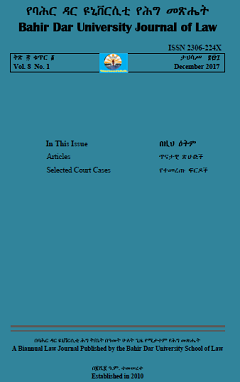Suspension of Penalty: The Legal Framework in Ethiopia and its Practice in the Amhara National Regional State Courts
Abstract
Conditional suspension of penalty is a legal device designed to suspend pronouncement and enforcement of penalty. Although the criminal proceeding presupposes conviction, sentencing and execution, articles 191 and 192 of the FDRE criminal code respectively provide for suspension of pronouncement and enforcement of penalty. Accordingly, a court may, upon the fulfillment of the conditions prescribed by this law, render either of the two depending on its possibility of reforming and reinstating the criminal.
Despite many challenges, suspending enforcement of penalty is commonly practiced in the regional courts. This study, therefore, attempted to identify the challenges thereto by employing a qualitative research method and arrived at the following major findings.
Unlike suspension of pronouncement of penalty, suspension of enforcement of penalty is rendered with the condition of two years’ probation period regardless of severity of the crime, punishment and the conduct of the criminal. Besides, failure to state the rules of conduct in a judgments, absence of follow up mechanisms, nonexistence of independent probation entity/officer and procedural rule as to revoking suspension are the major pitfalls demanding urgent action in the criminal justice system.
